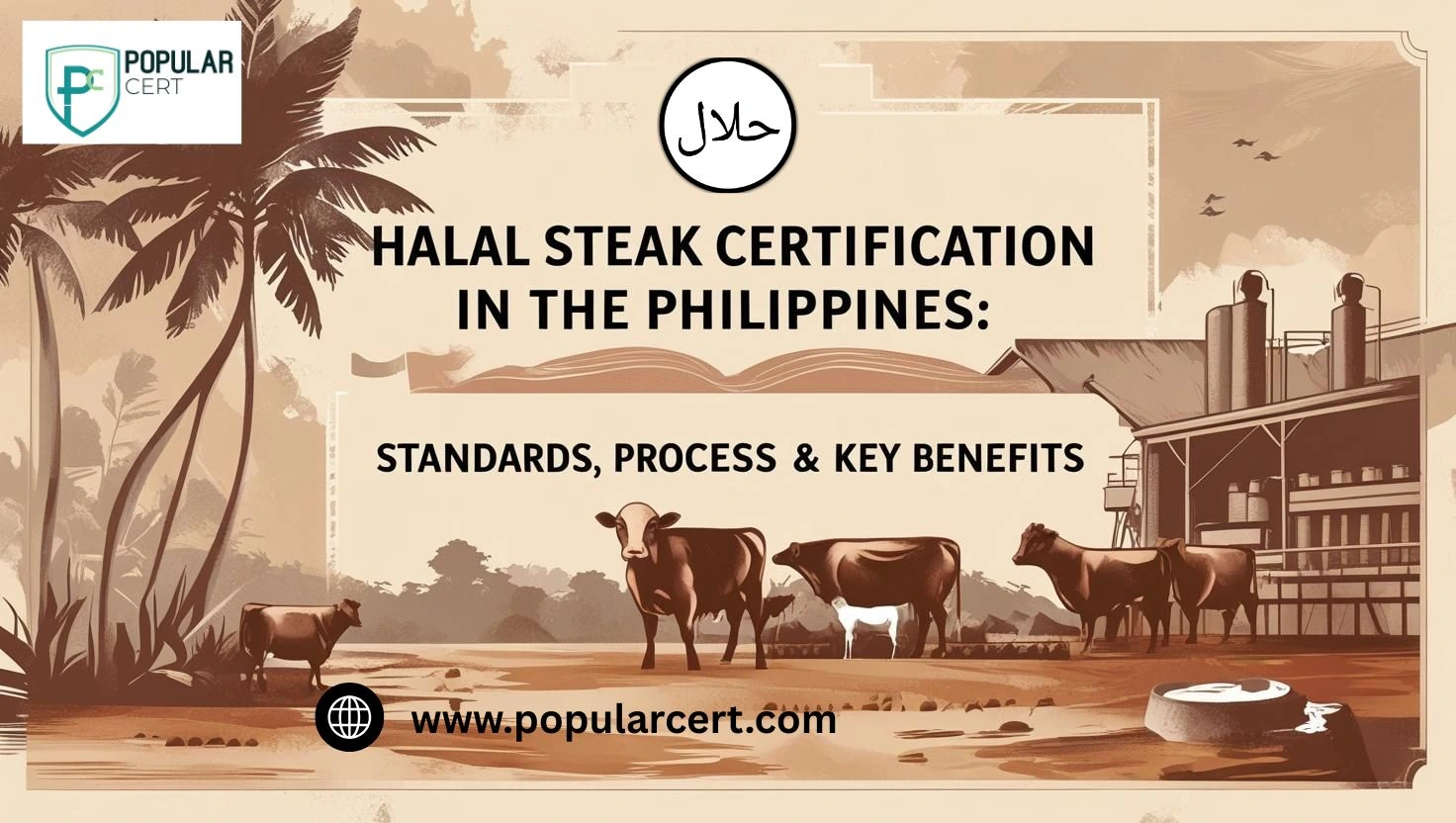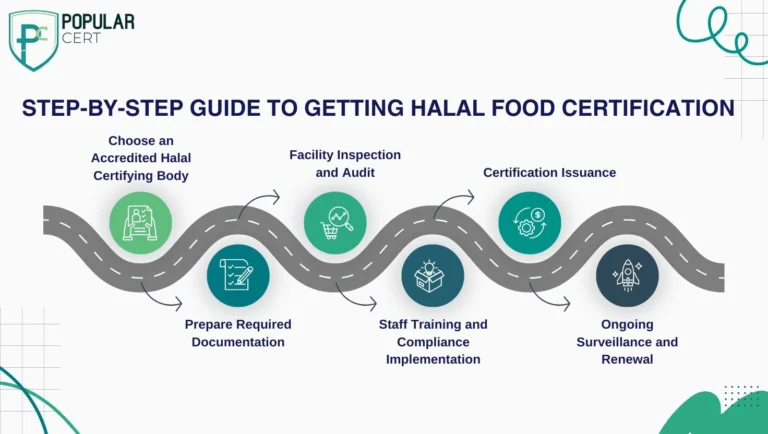Halal Steak Certification in the Philippines: Standards, Process & Key Benefits

Introduction
The halal-certified label has gained global recognition in recent years for the ethical and hygienic food practices it reflects. In the Philippines, where Muslims and health-conscious Filipinos are looking for what they eat, halal steak is gaining traction. Whether you own a restaurant, process or export beef, obtaining
Halal Certification In Philippines can be a business changer.What Is Halal Steak Certification?
Meaning and Importance
“Halal” is an Arabic term that means “permissible” under Islamic law. Pertaining to meat, halal certification guarantees:
- Animals are slaughtered in the name of Allah (zabiha),
- The process causes the least pain,
- Blood is fully drained,
- And the meat is prepared free from haram contamination with the utensils and surfaces used.
Application to Steak & Red Meat
Steak, predominantly beef, comes from animals that have to be slaughtered, processed, and stored according to strict halal requirements. This applies to every level of the supply chain, including butchering, transport, cooking, and serving, particularly for the restaurant and packaged food sectors.
Why Halal Certification is Important in the Philippines
Increasing Need for Halal Goods
- The Muslim population in the Philippines is over six million and is steadily rising.
- Merger tourism from Indonesia, Malaysia and other Middle Eastern countries is growing substantially.
- Ethical concerns and higher standards for hygiene and quality are now attracting even non-Muslim customers towards halal goods.
Trust and Marketability
A Halal Certificate acts as a trust seal:
- Validates compliance with religious and ethical requirements for consumer trust.
- Enables exporters to access markets with stringent halal import regulations for beef products
Who Requires Halal Certification?
- Meat processing plants
- Slaughterhouses
- Chains of steakhouses and fine dining restaurants
- Companies offering delivery services with beef or red meat
- Facilities for packaging and cold storage
- Suppliers and contractors involved in the logistics and supply chain may be required to uphold halal integrity.
Types Of Certification
- ISO Certification
- ISO 9001 Certification
- ISO 14001 Certification
- ISO 45001 Certification
- ISO 22000 Certification
- ISO 27001 Certification
- ISO 17025 Certification
- ISO 13485 Certification
- ISO 20000-1 Certification
- ISO 22301 Certification
- ISO 50001 Certification
- ISO 37001 Certification
- IATF 16949 Certification
- ISO 29001 Certification
- ISO 31000 Certification
- ISO 20121 Certification
- ISO 10002 Certification
- ISO 41001 Certification
Get Free Consultation
Our Clients


















Halal Certification Process for Steak in the Philippines
Step-by-Step Breakdown

Step 1: Choose an Accredited Halal Certifying Body
Choose a certifier like IDCP or MMHCB that is fully accepted by the NCMF and has national or international recognition.
Step 2: Prepare Required Documentation
Prepare and submit these:
- Company Profile
- Product Specification Documents (for example, kinds of beef and their processing methods)
- Ingredients and Suppliers List
- Cleaning and sanitizing SOPs
Step 3: Facility Inspection and Audit
The certifying body will physically inspect your slaughterhouse, kitchen or other “associated” restaurant processing units to ensure compliance with all relevant halal requirements.
Step 4: Staff Training and Compliance Implementation
Train all staff dealing with halal products on these areas:
- Product separation and handling
- Proper slaughtering (for processors)
- Contamination control and sanitation
Step 5: Certification Issuance
Once the necessary steps are taken, validation conducted, and through cross-checking done, you will be issued a Halal certificate which is normally valid for one year, subject to renewal conditions.
Step 6: Ongoing Surveillance and Renewal
Prepare for scheduled audits while maintaining compliance. Renewals are typically annual to maintain the certification.
Halal Standards and Compliance
Philippine certifiers align their standards with:
- GSO 2055-1 (GCC Standardization Organization)
- OIC/SMIIC global halal guidelines
- NCMF and Department of Agriculture regulations for halal meat
Benefits of Halal Steak Certification
For Meat Processors & Butchers
- Complies with religious slaughter requirements
- Enables exports to gcc, malaysia, indonesia
- Improves cleanliness and quality management systems
For Restaurants & Steakhouses
- Draws in Muslim customers and tourists
- Improves reputation for ethically sourced food
- Increases sales from halal-conscious patrons
For Exporters
- Facilitates clearance in halal markets
- Improves global competitiveness of products
- Encourages adherence to international trade regulations and compliance standards
Recognized Halal Certifying Bodies in the Philippines
Here are the key certifying bodies trusted locally and globally:
- National Commission on Muslim Filipinos (NCMF)
Government body that accredits halal certifiers
- Islamic Da’wah Council of the Philippines (IDCP)
A major private halal certification organization
- Muslim Mindanao Halal Certification Board (MMHCB)
Focused on halal food products from Mindanao
These bodies have many audits and fee structures, so picking one that aligns with your business goals is essential.
Obstacles and Solutions
Common Issues
- Misunderstanding the methods used for halal slaughter
- Risk of non-halal contamination in shared kitchens
- Inadequate training in halal food service
- Reluctance to spend due to business size
Possible Solutions
- Invest in brand halal certified suppliers for raw materials and exclusive halal equipment
- Purchase dedicated halal workspaces or equipment
- Willing to spend more on halal certified training or documentation
How Popularcert Helps You with Halal Certification
We help food entrepreneurs ease into the halal certification process with these services:
- Assist in selecting the appropriate halal certifying agency with tailored guidance.
- Detailed document preparation and submission with direct representation of the clients.
- Grant active technical assistance on training and auditing of the covered facilities.
- Active technical assistance for regulatory needs after the certification is granted.
- There is Assistance available for export-marketing businesses and local-marketing businesses.
We are serving registered restaurants and meat export units and food processing plants in the Philippines as well as other regions.
Begin your journey – Get Your Steak Halal Certified
Do not lose your business opportunities in the halal segment in the Philippines and overseas.
With Popularcert, your certification can be obtained in a shorter period, global halal requirements will be met, and full confidence in serving the customers will be achieved.
Reach out to Popularcert today for your consultation on halal certification and grab the offer of no-charge consultation to start your journey on compliance, trust, and business growth.
GET A FREE CONSULTATION NOW
FAQs
What is Halal steak certification and why is it important?
Halal steak certification verifies that beef products are processed according to Islamic dietary laws, including humane slaughter and clean handling. It’s important for building trust with Muslim consumers and accessing global halal markets.
Who issues Halal certification in the Philippines?
Halal certification in the Philippines is issued by recognized bodies such as the National Commission on Muslim Filipinos (NCMF), Islamic Da’wah Council of the Philippines (IDCP), and the Muslim Mindanao Halal Certification Board (MMHCB).
How long does it take to get Halal steak certified in the Philippines?
The certification process typically takes 2 to 6 weeks, depending on your business size, preparedness, and the certifying body’s schedule.
What businesses need Halal steak certification?
Businesses such as meat processors, restaurants, steakhouses, exporters, and food delivery services offering steak or red meat dishes need Halal certification to serve Muslim consumers or export to halal markets.
Can Popularcert help with Halal certification for steak in the Philippines?
Yes! Popularcert provides complete support for Halal certification, including documentation, training, audit preparation, and coordination with recognized halal certifiers in the Philippines.
